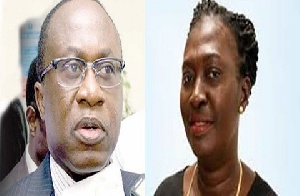The Supreme Court has set a June 7 date to give its judgment on an application brought before it by lawyers of former NCA board chair Eugene Baffoe Bonnie and four others seeking full pre-trial documents the state sort to rely on.
This was after the Deputy Attorney General told the court it received the statement of cases for all accused persons, and has filed a composite statement in response to all the issues raised.
The seven-member Supreme Court panel had ordered lawyers for the former board chairman of the National Communication Authority Eugene Baffoe Bonnie, and four others who are facing trial for causing financial loss to the state, to file their statement of case within two weeks.
The apex court further directed the chief state attorney to within two weeks of receipt of that of the plaintiffs file its statement of case.
The order has been adhered to paving way for the apex court to give its judgment.
The Accra High Court put on hold proceedings following an application by defense lawyers seeking to have the prosecution make known all witnesses they will be relying on, and also make available all the documents it intends to tender as evidence.
This was opposed to by the prosecution who argued that the request was seeking an interpretation of aspects of the Constitution, (Article 19 (2) (e) and (g)), a task that can only be performed by the Supreme Court.
Delivering his ruling, Justice Eric Kyei Baffuor said the issue of interpretation had arisen since lawyers on both sides disagree on the meaning of the relevant provisions, hence the need to refer the matter to the Supreme Court.
The questions expected to be addressed by the Justices of the Apex Court are whether accused persons are entitled to comprehensive trial disclosure, at what point this should be done, and whether the accused persons are entitled to all documents including those the AG may not use in court.
Background
The case in question involves the former Director General of the NCA, William Tevie, Eugene Baffoe Bonnie and two others, who have been arraigned for alleged fraud and causing financial loss to the state over the alleged fraudulent $6 million contract signed between the NCA and Infraloks Development Limited (IDL).
The five are said to have fraudulently withdrawn some four million dollars from NCA accounts without justification.
Reports indicate that an Israeli company, NSO Group Technology Limited was contracted to supply the surveillance equipment at the cost of $6 million, to enable National Security monitor conversations of persons believed to be engaged in terrorism.
IDL was also reportedly charging $2 million to facilitate the transaction, bringing the total sum to $8 million.
But the three, through the said contract, allegedly withdrew $4 million from the accounts of the NCA and have failed to account for it.
Only $1 million was allegedly paid into the accounts of the Israeli company.
So far, the NCA’s Director of Legal Affairs is one of the key witnesses to who has made an appearance in court.
General News of Tuesday, 24 April 2018
Source: 3news.com













